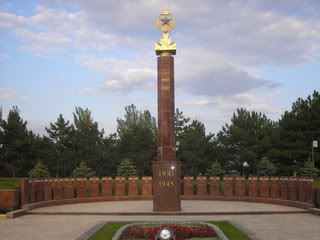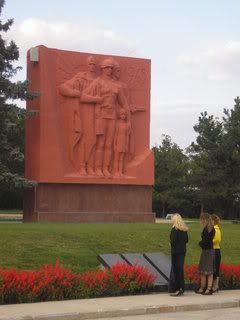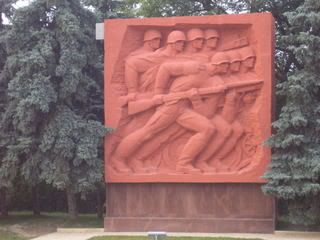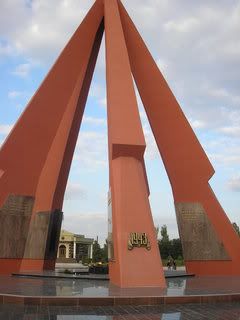Nationalism
I tend to disparage my new country of residence, Moldova, probably more often than I should. This probably is due to my coming from a land of plenty, living here in a land of aught.
Indeed, Moldova lacks many things that would be conducive to a more comfortable lifestyle: a government that actually tries to hide its corrupt and self-serving practices, occasional gestures of civility by the populace, and proper toy stores of course being at the top of the list. Those in the villages must even do without such niceties as indoor plumbing and reliable electric power. Believe it or not, Moldova is even bereft of a rock club, as the last such venue in Chisinau, the nation’s capital, closed its doors last spring. Thus, the late-night landscape is littered with a smattering of tacky EuroTrash discos that, while good for a laugh, could not actually be called ‘good’ by any stretch. Living in Moldova, one learns to do without.
Yet, many of the things Moldova lacks make this a fascinating country to live in as well. The absence of strip malls stretching into the horizon is certainly welcome, along with the interconnecting network of 6-lane asphalt veins that conduct fume-chugging SUV’s between them. The absence of pesticides on the fresh, market-bought vegetables and the lack of sulphides in the plentiful and inexpensive Moldova-produced wines are also quite nice. But the one thing that makes Moldova even more fascinating to me is the almost complete absence of nationalism in the country.
This I think is an important absence to note. Since the end of the Age of Empires and the rise of democracy, nationalism has spread as a scourge through the populations of almost every country on earth. When suzerains became their own nations and when feudal lords no longer held power over the proletariat masses, people began to conjure the notion that their own countries were actually important for their security and prosperity. Now, in the early 21st century, nationalism seems as prevalent a force in current affairs as any. America’s sense of self-importance is as much as cause of the war in Iraq as oil, 9-11, or FOX News. Russian nationalists roam in gangs down the darkened streets of Moscow and St Petersburg, searching out and beating the ethnic minorities of a former empire that once stretched all its resources just to bring these minorities into the USSR, all to make their nation ‘pure’ again. Despite the social atrocities and over-pollution that plague China, China’s historic growth as an economic powerhouse is due in large part to the pride the Chinese people have in their millennia-old motherland. In South Korea, nationalism is so great that many Koreans – rather than believe anything negative about their kinsfolk to the north - consider reports of Kim Jung Il’s atrocities in North Korea and his terrorist nuclear program nothing more than “American propaganda.” Truth, it seems, has no teeth compared to the mighty gnash of nationalism.
In case you couldn’t tell from my tone heretofore, I have long held nationalism to be a bad thing. Nationalism fueled the fires of WWI, WWII, and the Cold War. Nationalism allows a populace to be pumped full of jingoism and driven as a brainwashed mob much like teenagers at a jr. high school pep rally. Moreover, nationalism stands for nothing. What is a nation but a set of rules established by the ruling elite made to control its tax-spending masses? How can one be proud of such a thing? One may be proud of one’s culture, one may be proud of one’s religion, one may even be proud to live in a beautiful landscape amongst beautiful people. But these features of one’s environment are distinct from one’s nationhood. Zaire and the Democratic Republic of Congo are different nations, despite both occupying the same borders and containing the same populace. Nationalism is but pride in one’s government, a feeling that one’s leaders are infallible (and subsequently unquestioned) thinly disguised as pride in something – anything –else. Nationalists, then, follow the flag-waving propaganda spewed by their government, blindly stumbling after the jingoist rhetoric their leaders extol, ensuring that their nations have enough cannon-fodder for any ill-conceived engagement to be successful and that their government can do no wrong. Or so I have always held.
But living in a country without nationalism has made me question my assumptions.
Many developments in the relatively short history of this young republic have led me to the conclusion that Moldovans simply do not care about their country. Despite the fact that Moldova declared independence from Russia after the fall of the USSR, the Moldovan population allows the minority of Russian elite left behind by the empire to control nearly all aspects of the nation’s government, economy, and culture.
As evidence of this fact, one need only open one’s ears and listen to the language spoken on the streets. Historically, Moldova was a part of Romania. The state of Moldova was split in half as an outcome of the war between the Ottoman and the Russian Empires, with the western half remaining in Romania and the eastern becoming part of the Russian Empire. Thus, the great majority of Moldovans are native Romanian speakers. Despite this fact, when the country was to decide upon a national language, the Russian elite would not allow Romanian to be considered. As a compromise, Romanian was re-dubbed “Moldovan” and established as the national language – a move that would be akin to Mexico declaring its national language “Mexican” or Americans deciding they speak “American.” All this is rather a moot point, however, as in the nation’s capital one is often hard-pressed to hear “Moldovan” anywhere anyway. The cinemas all showcase their movies dubbed in Russian, Russian bookstores far outnumber their Romanian/ “Moldovan” counterparts, and several members of Parliamant cannot speak a word of “Moldovan”. This linguistic anti-national trend is so prevalent that, in fact, many native Romanian speakers choose to speak Russian in society, embarrassed of their mother tongue. Contrast this to Poland or Kazakhstan, other post-Soviet states, where people who were forced to speak Russian in Soviet times pointedly refuse to speak it any longer, even to Russian tourists, and you have a sense of how little sense of their own “Moldova-hood” the people here have.
There is so little national pride here in Moldova that a small sliver of this already miniscule land has already ventured to create its own nation: Transnistria. Transnistria, with a population of just over 500,000, declared its independence from Moldova the very year after Moldova declared its own independence. While it is true that Transnistria was never a part of Romania nor of the Moldovan state prior to integration into the Moldovan SSR in Soviet times, Moldovans constitute the greatest percentage of the population (31.9% in 2004). Transnistrian independence, then, seems based more on nationalist than cultural factors. That is, rather than be a part of the new, Moldovan nation, Transnistrians would rather remain faithful to their now defunct nationhood: the USSR. The Soviet hammer and sickle adorns the Transnistria flag. Soviet monuments to cosmonauts, Lenin, and the proletariat dominate public squares, and the Romanian language (being definitively Romantic) is written in Cyrillic letters – a throwback to Soviet days when Moldovans were forced to write their language in the Russian script. Moldovans themselves, when they visit the breakaway republic, feel they are “back in the USSR.” How can this shadow of nostalgic Soviet nationalism be so prevalent it would drive a people to secede? Only if the real, prevalent sense of nation-hood in Moldova is even weaker in comparison.
One may even doubt if Moldova really exists as a nation. Despite the fact that independence was officially declared on August 27, 1991, Moldova feels as much a part of Russia as ever. This year, a large investment was devoted to upgrading the park in central Chisinau dedicated to recognizing the Russian victory over axis forces in WWII. It may be interesting to note that Moldova declared its reunification with Romania just prior to WWII and that Romania, in order to maintain its hold on Moldova, made an alliance with Germany. In effect, this park exists to celebrate the defeat of Moldova at the hands of the Soviets and honors the Russian soldiers who killed Moldovans in the process. The re-opening of this park, in fact, was more lavish and spectacular than the celebrations held on the recent National Language Day (that is, to celebrate the recognition of “Moldovan”). The government continues to maintain close ties with Russia and conforms to Russian policies, favoring imports of Russian goods over those from Europe despite the fact that Russia has deemed Moldovan wines (the only Moldovan export worthy of note) as un-sanitary and has banned all imports. Moldova itself seems to have recognized that, in fact, it is still a part of the Russian Empire; this year, the government changed the name of the holiday from “Independence Day” to “Republic Day”. I suppose you can’t nominally celebrate an independence that does not in fact exist.
I cannot help but believe that, if more Moldovans cared about their nation, Moldova would be a more prosperous and joyful land. If Moldovans stood up for their cultural integrity, they probably would not let the Russian minority openly insult them in public and allow themselves to feel ashamed for being the economically disenfranchised minority of their own country. If Moldovans really cared about their nation, they would probably not vote for officials who cannot speak their own language, who act only to line their own pockets with tax revenues and IMF incomes, and who care more about appeasing their Russian mafia counterparts than their own constituents. If Moldovans cared about their nation, there would be public outcries against tax monies poured into the updating of a park meant to commemorate the USSR rather than into upgrading the country’s collapsing hospitals and schools. If Moldovans cared about their nation, perhaps there would be greater support for Moldovan-made goods than for those made in Russia or Ukraine, so much so that there would be greater domestic productivity, more jobs would become available, and Moldovan citizens would not have to leave their country just to find work. Maybe, I am beginning to consider, nationalism is not such a bad thing after all.
But how much nationalism is too much? When does the line between caring for one’s country and becoming a rabid jingoist get crossed? Some happy medium between Moldova and, say, the USA must exist, but where? Sweden, perhaps?
Yes, nationalism can be evil. It can brainwash a populace from perceiving its country’s own criminal undertakings, can provoke a people unto genocide, and can make a society insufferably full of itself. But nationalism can also keep a country economically stable, its society cohesive, and its government liable to the scrutiny and condemnation of its people. Nationalism, but in moderation.



